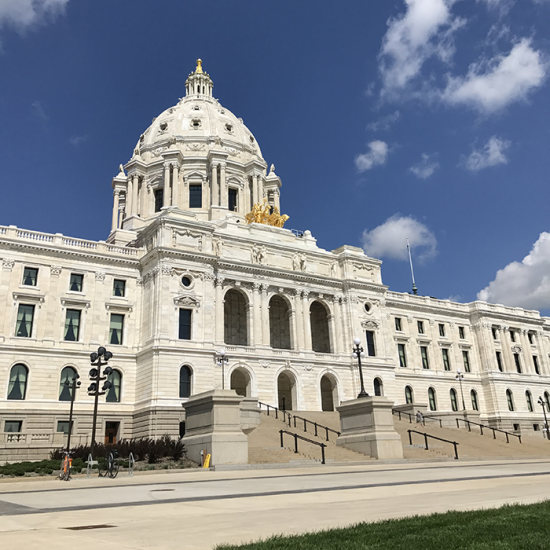
Building a Stronger, More Diverse Mental Health Workforce
This past legislative session, Wilder partnered with NAMI Minnesota to advocate for legislation to strengthen our mental health and substance use disorders (SUDs) treatment system. Our goal is to build a more stable, diverse and culturally informed mental health and SUDs workforce throughout the state. This work was championed by Representative Samantha Vang and Senator Paul Utke and received excellent bipartisan support in the legislature as well as the support of many mental health providers, advocates, associations, and higher education institutions across the state.
I’m pleased to share that the state legislature passed a bill that will create additional avenues to help meet the mental and chemical health needs of all Minnesotans. The bill is the result of years of advocacy and feedback from multiple stakeholders, including people served by the system, leaders in our field, providers and communities.
Loan forgiveness for LADCs
Licensed Alcohol and Drug Counselors (LADCs) are now eligible for the state’s loan forgiveness program for health care professionals serving high-need areas. LADCs are critical providers in our community and being able to qualify for loan forgiveness helps retain providers and recognizes the field as an important part of the healthcare continuum.
Cultural competency continuing education standards
Mental health professionals need to complete continuing education standards to stay current with their licensure. The new bill includes basic requirements for a portion of those continuing education credits to be related to cultural competency. Cultural competency requirements mean that all of us in the field will be accountable for continuing to learn about how to effectively provide treatment and services to an increasingly diverse state.
Cultural diversity standards for licensing boards
State licensing boards for psychology, social work, marriage and family therapy, and behavioral health now all have comparable requirements for regional and cultural diversity membership. Having licensing boards that reflect our state will ensure that more voices, experiences, and worldviews are considered when boards are making critical decisions that impact our field and workforce. Who is at the table and who gets to make these decisions matter. Leadership and representation on our licensing boards matter.
Funding to increase the number of clinical supervisors from Black, Indigenous, People of Color (BIPOC) and other underrepresented communities
There is funding to support the pathway for licensed mental health providers from Black, Indigenous, People of Color (BIPOC) and other underrepresented communities to become board-approved supervisors in their respective fields. As I wrote above about the licensing boards, representation in leadership matters. This will lessen the economic burden and remove barriers for our leaders today and tomorrow who will be responsible for training and supporting new generations of our workforce. It is critical that they reflect the people of our state.
Expanding mental health practitioner roles
The term “mental health practitioner” now includes undergraduate and graduate psychology, social work, and counseling students in formal practicum/internship placements. This change will allow us to move upstream in how we recruit and retain staff in our field. Fewer students will need to choose between working to support their families or completing their internship and college education. This also means we’ve just opened up an entire workforce that wasn’t available before.
The creation of a statewide, culturally responsive mental health task force
This taskforce will provide ongoing recommendations to the legislature, licensing boards and mental health service providers to continuously improve our mental health and SUDs system.
These changes will go a long way in addressing workforce shortages in the mental health/SUDs system, both in urban and rural communities. While I am deeply heartened by how far we were able to get with the workforce bill, there were a few things that didn’t get included that I hope we can remain in dialogue about.
Examining barriers to licensure
The aspect of this legislation that was not included but is one of the closest to my heart is the creation of a task force to review and recommend solutions regarding barriers to licensure. In my career as a mental health provider and supervisor, I have seen talented, well-qualified colleagues struggle to navigate the path to licensure. More often than not, these providers are first generation college students, or identify as BIPOC, or grew up speaking a language other than English, or all three. It is heartbreaking to see competent and smart clinicians repeatedly fail their licensing exam.
Having worked with or personally supervised some of these excellent clinicians, I know that not passing the test has no relationship to their competence as clinicians. In addition to the wear and tear on someone’s soul to repeatedly fail a licensure exam, this is a matter of equity. Without a license, clinicians can’t practice independently and they can’t advance in our field. Sometimes these clinicians find themselves working under the supervision of someone less experienced, but nevertheless someone who was able to pass the test and get licensed. Sometimes these clinicians find themselves without a job because organizations can only afford to keep supporting an unlicensed clinician for so long. And sometimes, these clinicians end up leaving the field altogether for practical and morale-related reasons.
I believe that as a field, we are strong, knowledgeable, curious and compassionate enough to take a hard look at ourselves and question our own assumptions about barriers many of our colleagues have faced. We must be confident enough in our professional knowledge and expertise to turn the lens back on ourselves—after all, we ask this of our clients every day. The future of our fields depends on our ability to keep challenging ourselves to lean in and do better for our current and future workforce and for our communities.
I feel encouraged and inspired by the statewide and bipartisan support for efforts to improve our workforce. We have accomplished a lot. We’ve been gifted an opportunity by the legislature this past session to do more. And we’ve definitely got more to do.